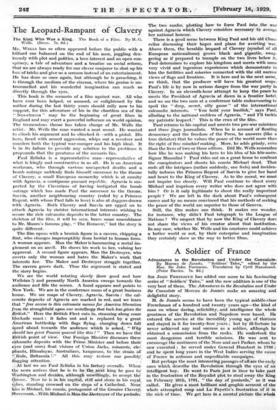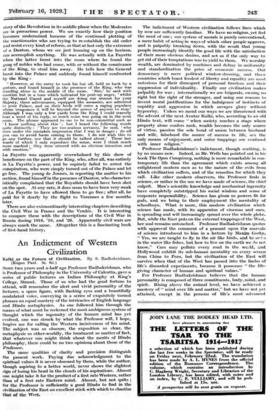A Soldier of France
Sin Jomi FORTESCUE has added one more to his fascinating series of " Soldiers' Tales," and the new addition is one of the very best of them. The Adventures in the Revolution and Under the Consulate of Moreau de Jonnes make an amazing and
delightful story.
M. de Jonne,s seems to have been the typical middle-class
Frenchman of a hundred and twenty years ago—the kind of man on whose daring, reliability, and intelligence the whole greatness of the Revolution and Napoleon were based. He entered the service at the incredibly young age of thirteen and stayed in it for twenty-four years ; but by ill-fortune he
never achieved any real success as a soldier, although he obtained a commission from the ranks. He undertook the most dangerous and terrible missions. He was sent to encourage the mutineers Of the Nore and met Parker, whom he saw executed ; he served under General Humbert in 1798 ; and he spent long years in the West Indies serving the cause of France in arduous and unprofitable campaigns.
But perhapi the most interesting passages of all are the early
ones which describe the Revolution through the eyes of an intelligent boy. He went to Paris just in time to take part in the frustration of the Royalist plot to steal away the King
on February 28th, 1791, " the day of poniards," as it was called. He gives a most brilliant and graphic account of the whole attempted coup and Le Fayette's frustration 'of it in the nick of time. We get here in a mental picture the-whole
story of the Revolution in its middle phase when the Moderates are in precarious power. We see exactly how their position
becomes undermined because of the continued plotting of the reactionaries who are trying to re-establish the old order and resist every kind of reform, so that at last only the extremes of a Danton, whom we see just looming up on the horizon, can accomplish anything. He was actually with La Fayette
when the latter burst into the 'room where he found the gang of nobles who had come, with or without the connivance of the King, to steal him away. He tells how the General
burst into the Palace and suddenly found himself confronted by the King:
" However, at the entry he took his hat off, held us back by a gesture, and found himself in the presence of. the -who was standing alone in the middle of the room. ',Sire, he said with emotion but in a tone which indicated his pent-up anger, 'whilst the National Guard and myself are doing our utmost for your Majesty, these adventurers, equipped like assassins, are admitted to your Palace, and on their heels will come a raging populace whose vengeance it will be beyond the power of anyone to stop.' Although I was only a few yazds from the King I could starcely hear a word of his reply, so much noise was going on in the next room. The phrase appeared to me to be non-committal such as 'I know nothing about this ' ; but I heard the following words quite distinctly : They are too-zealous servants,' he said, who were under the mistaken impreasion that I was in danger ; do all you can to, avoid harm coming to them. I do not wish this to go any further, nor that it should be talked about.' These last words of which I only reproduce the sense, were I think much more marked; they were uttered with an obvious intention'and
with emotion."' '
La Fayette was apparently overwhelmed by this show of beneficence on the part of the King, who, after all, was entirely in La Fayette's power, and he supinely failed to arrest the conspirators, who were simply turned out of the Palace and let go free. The young de &miles, in reporting the matter to his section, found himself in the presence of Dantim, who character- istically complained that the Royalists should have been shot on the spot. At any rate, it does seem to have been very weak of La Fayette to have allowed them to go free; after all, he paid 'for it dearly by the flight to Yarennes a few months later.
There are also extraordinarily interesting chapters describing the' Civil War in France and the Vendee. It is interesting to compare these with the descriptions of the Civil War in
Russia during 1918, '19, and '20. Apparently civil wars are always much the same. Altogether this is a fascinating book of first-hand history.











































 Previous page
Previous page